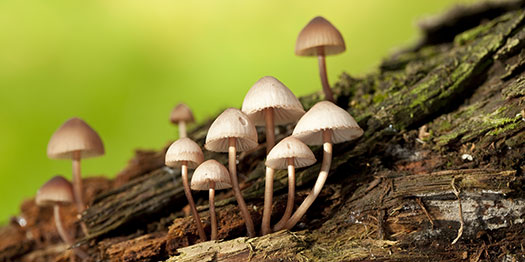What are Mushrooms?
Psychedelic mushrooms are hallucinogenic mushrooms that alter a person’s state of mind and consciousness. Psilocybin mushrooms, also known as Magic Mushrooms, are fungi. The main physical concern about Psilocybin mushrooms are that they are very similar to other types of mushrooms that are extremely toxic. The Magic Mushroom fungi are grown in the United States, Mexico, the United Kingdom and South America, and a growing trend of mushroom addiction and abuse.
They contain psilocybin which is the active ingredient. When it is ingested, the psilocybin breaks down and produces psilocin which causes hallucinations. Mushrooms are normally dried and then eaten or the user will brew it into a tea and drink it.
The mushrooms are natural but they can be synthetically produced as well. When someone consumes the mushrooms, they will enter into an altered state of consciousness or into a “psychedelic experience” and experience synesthesia, which is the crossover of senses like hearing colors and seeing sounds.
When the person using mushrooms has this “psychedelic experience” it is called a “trip” where visual hallucinations are quite prevalent. Magic mushroom trips will normally last between 5 and 12 hours. Other names for mushrooms are Shrooms, Boomers, Caps, Liberty Cap, Silly Putty, and Simple Simon.

Mushrooms Addiction Statistics
Mushrooms are a physically non-addictive hallucinogen. However, they can be potentially habit forming. A user’s tolerance quickly increases and thus the drug has a reduced effect. The tolerance lasts for a few days and causes cross-tolerance with other psychedelics such as LSD, DMT, and mescaline.
A Johns Hopkins study stated volunteers in an experiment rated a psilocybin session as among the top five most or as the topmost spiritually significant experience of his or her life [1]. Other mushroom statistics include the following:
- Under higher doses, up to a third of those questioned experienced great fear or anxiety or had delusions, yet those reactions, the researchers report, were managed with gentle reassurance from the study monitors and did not outlast the session or harm the volunteers [1].
- The active compounds in psilocybin-containing “magic” mushrooms have LSD-like properties and produce alterations of autonomic function, motor reflexes, behavior, and perception [2].
- In a recent experiment, volunteers were given preparatory guidance and five sessions each a month apart, four with different doses of psilocybin and one with placebo (no dose). While the positive effects of psilocybin increased with increasing doses, the likelihood of fear or delusions increased sharply at the highest doses. At the second-highest dose given, two-thirds of the volunteers rated the experience as among the five most spiritually significant of their lifetime [1].
- According to the National Survey on Drug Use and Health (NSDUH)*, there were approximately 1.1 million persons aged 12 or older in 2007 who reported using hallucinogens for the first time within the past 12 months [2].
Causes of Mushroom Addiction
Mushrooms are not physically addictive, and thus far they are not linked to brain damage. The drug has a low toxicity level, and withdrawal symptoms are not exhibited due to continued mushroom use. They have a rapid tolerance level build-up, but it reduces after a few days.
Mushrooms are not physically addictive, but there is a possibility of psychological addiction. Often, it is the “spiritual journey” that can become addictive. Sometimes people will begin abusing mushrooms because they are seeking a more intense spiritual awakening.

Signs of Mushroom Addiction, Use, and Dependence
Thankfully, a person using mushrooms will not become physically addicted to them. There is a possibility that a man or woman can become psychologically addicted. This may occur because the abuser has become addicted to taking the trips. The mushroom user may be on a “good trip” or a “bad trip”. It all depends on many various factors. Some of these factors are:
- Mood
- Previous experiences
- Sense of well being
- Dose strength
- State of mind
- Physical environment
The user can exhibit one or several of the following characteristics:
- Dilated pupils
- Increase or loss of appetite
- Changes in personality
- Euphoria
- Increased heart rate
- Distorted perceptions
Mushroom Effects
When abusing mushrooms, a number of negative results can be experienced. Short-term and long-term consequences happen that produce negative mental and physical outcomes. There are minimum physical side effects to using mushrooms, but there are possibilities of danger.
The psychological reactions can be very strong and risky. People often use mushrooms as a spiritual aid, or they will use it to escape from reality. Some physical side effects include:
- Hypothermia
- Loss of appetite
- Dilated pupils
- Impaired motor skills
- Increased heart rate
- Nausea
- Vomiting
- Hyperthermia
- Chemically induced type of mental illness
- Stomach pain
- Increased blood pressure
- Rapid breathing
The psychological fallout of using mushrooms are abundant. Prolonged use of the drug can cause short-term memory loss, paranoia, hallucinations, and onset or relapse of schizophrenia. Other psychological side effects include:
- Pleasant emotions
- Flashbacks
- Unpleasant emotions
- Panic attacks
- Severe depression
- Objects appear to breath
- Schizophrenia
- Emotional swings
- Paranoid delusions
- Psychosis
Many of these side effects will last for the entire mushroom trip. Some of the more serious side effects can continue weeks or years after the mushroom user has quit using the drug. Normally, the effects will lessen soon after the drug has run its course.
One also needs to take into consideration the various outcomes mushrooms can have on other areas of life. There is the potential loss of the user’s family, the end of a career, and the loss of financial stability. Using mushrooms can result in time spent in prison.
Mushroom Withdrawal
Mushrooms do not have physiologic symptoms of addiction. Though, long-term abusers of mushrooms may experience depression, insomnia, or “flashbacks”.
A flashback is the experience of a mushroom trip days, months or years after using the drug. These unexpected “psychedelic trips” can be caused by stress, sleepiness, or other drugs such as alcohol or marijuana. There is no documented evidence of withdrawal symptoms to abusing mushrooms.
Mushroom Addiction Treatment
The addiction treatment for mushrooms is different than most treatments provided. Although mushrooms are not addictive, the user can sometimes develop a habit of abusing the drug. The primary treatment for mushroom abusers is to keep them calm and stress-free.
Rehab on the psychological dependency would be the main focus. Since there is not an antidote to stop a trip on mushrooms, the person has to continue through until the drug wears off. There are many varieties of rehab and multiple approaches.
An effective treatment center will use several methods to create a personal program around the mushrooms abuse and related disorders. Treatment for mushroom abuse needs to address the drug use and the psychological issues that may be promoting the use.
The success of defeating the abuse of mushrooms will depend on the rehab center, friends and family, the treatment psychotherapist, but most of all, it depends on the user acknowledging there is a problem and asking for help from loved ones and professionals.
References
[1]: Newswise – http://www.newswise.com/articles/view/577702
[2]: National Institute on Drug Abuse (NIDA) – http://www.drugabuse.gov/publications/drugfacts/hallucinogens-lsd-peyote-psilocybin-pcp
Last Updated & Reviewed By: Jacquelyn Ekern, MS, LPC on October 20, 2018
Published on AddictionHope.com, Resource For Addictions
